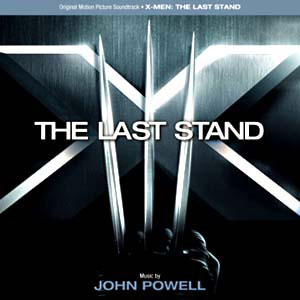X-Men: The Last Stand
Music composed, arranged, programmed, and produced John Powell
Performed by The Hollywood Studio Symphony
Available on Varese Sarabande (VSD-6732)
Running Time: 61:38
Amazon UK Amazon US

See also:
Ice Age: The Meltdown United 93 For me, the X-Men movies have been particularly interesting in musical terms. Michael Kamen’s much-maligned score for the first Bryan Singer film is a personal favourite of mine, while John Ottman, a composer whose early work I quite admired, has become increasingly the bubble gum composer of choice (The Fantastic Four etc.) and his music for the second X-Men film was strangely insubstantial. (Let me hastily add that Ottman’s more recent film music is not without value, but it just sounds somewhat production-line at times.) And speaking of production lines, the announcement of John Powell taking over on the third X-Men installment could well have indicated a continuation of this thinking, considering Powell’s association with Hans Zimmer’s often unpopular Media Ventures team of composers.
A surprise it might be for some then that Powell has produced a rousing, hugely melodic triumph, certainly the most distinguished thing about a very mixed film and it’s the music that elevates the best cinematic sequences to something approaching true artistic quality. Most notable in both the film itself and as an individual cue is ‘Dark Phoenix’s Tragedy’, featuring an outstanding interpretation of Powell’s key motif, first heard in ‘Whirlpool of Love’ and developed through the score until its resounding, emotionally poignant rendition on ‘Phoenix Rises’. There’s also a nice variation, backed by percussion in ‘The Last Stand’, but disappointingly this only plays over the end credits and does not support the visuals as I would have hoped. This motif for the conflicted character of Jean Grey as she struggles with her uncontrollable dark side, enriches all of the most striking moments in the movie and demonstrates Powell’s ability to write memorable themes.
Also worth a mention is the new main theme proper, heard initially on ‘Bathroom Tiles’ and despite being brief and rather underused it’s undeniably effective and stirring enough. Probably Powell’s most significant achievement on this score though is his dynamic use of brass, with the aforementioned ‘Dark Phoenix’s Tragedy’ featuring some truly impressive brass trills and frills that certainly brought a big smile to my face. Although there are sections where more generic action writing takes over, Powell always has a melodic ace up his sleeve and the score never fails to hold the attention. He even manages to introduce a John Barryesque theme mid-way through, first heard in ‘The Funeral’ and this only adds to the overall substance of the score.
Along with his sometime collaborator, Harry Gregson-Williams, John Powell is developing into a very fine artist and I think that sooner of later, those who have criticized these composers and indeed their mentor, Hans Zimmer, for what some fear is the advent of commodity film scoring, will have to reassess their thinking.
Mark Hockley
Rating:
4
Michael McLennan adds:-
Between United 93, Ice Age: The Meltdown and the score for Brett Ratner’s unfortunate conclusion to the X-Men saga on film, John Powell has written some of the best cues of the year in film music. For this score, it’s ‘Dark Phoenix’s Tragedy’, and it’s a beauty. I hadn’t heard the album when I saw the film, but Powell turned what seemed on paper to be a contrived scene into the most compelling sequences in the film. The use of a haunting long-line melody to drive a quickly-edited action scene with character elements seemed like one of the freshest pieces in film music in a special-effects driven blockbuster in some time. (Though perhaps it’s a comment on the overuse of orchestral film music in films of this ilk that really good scoring seems like a welcome stranger.)Elsewhere the music never quite seems to matter as much as it did in that cue. Though the choral use is sparing, the almost uninterrupted scoring of the final battle (a countable twenty minutes) still collapses into a wall of uninterrupted anvil hits and other excessive gestures that all manage to cancel each other out. On album the twenty minutes of rumbling and churning is almost as annoying as it was in the film, and not even the return of the Phoenix motif in ‘Phoenix Rises’ takes us back to the heights of the earlier sequence, the emotional intensity crushed under the bombastic orchestration.
Still, while it proves overlong and uneven as an album, there’s no denying the intelligence on display here. Powell tips his hat to both John Williams and Danny Elfman’s seminal work in the superhero genre. The architecture of the thematic development is impressive, with at least four new themes carried through the story and feeling like they were always part of this trilogy. (The ‘John Barry’ reading of the main title theme in ‘The Funeral’ is a lovely spin on that theme.) The strength of Powell’s underscoring of one sequence in particular makes the rest feel lax in comparison, but for some this will be the greatest thing since sliced bread, and more accessible than Powell’s more understated score for United 93.
Michael McLennan
Rating:
3.5
Return to Reviews Index